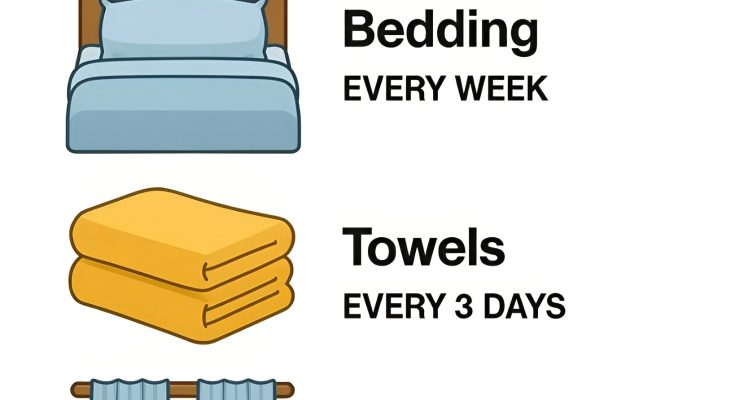In our fast-paced world, it’s easy to overlook the importance of regular maintenance and refreshment of everyday items in our homes. Many people are unaware of how often they should replace or clean common household items, which can lead to decreased efficiency, hygiene issues, and even health risks. Understanding the correct schedule for refreshing these items can improve your quality of life and ensure a healthier living environment.
From the sheets you sleep on to the air filters that keep your home fresh, each item has its own timeline for when it should be refreshed. This guide will walk you through the optimal frequency for refreshing various household items, ensuring that you maintain a clean and healthy home.
1. Bedding: Refresh Every Week
Your bedding, including sheets and pillowcases, should be washed every week. This is because they can accumulate sweat, body oils, and dead skin cells, which create an ideal environment for dust mites. Washing your bedding in hot water, at least 130°F (54°C), can help kill dust mites and remove allergens. Regularly refreshing your bedding not only promotes better hygiene but also contributes to a more restful sleep.
2. Towels: Refresh Every 3 Days
Towels are used daily and can quickly become breeding grounds for bacteria due to their damp environment. It’s recommended to wash bath towels every three days to prevent the growth of bacteria and mold. Use hot water and a good detergent to ensure they are thoroughly cleaned. Hand towels, which are used more frequently, might need to be refreshed even more often, especially in a shared bathroom.
3. Curtains: Refresh Every 6 Months
Curtains can collect dust, allergens, and odors over time, especially if windows are frequently opened. To maintain a clean and fresh home environment, it’s advisable to wash or dry clean your curtains every six months. If your curtains are machine washable, use a gentle cycle with cold water to prevent shrinking. For heavier or more delicate fabrics, professional cleaning might be necessary.
4. Pillows: Refresh Every 1 to 2 Years
Pillows can harbor dust mites, mold, and bacteria, which can affect your health and sleep quality. It’s recommended to replace pillows every one to two years, depending on the material and usage. In between replacements, washing your pillows every three to six months can help maintain their freshness. Be sure to follow the care instructions, as some pillows can be machine washed while others may require spot cleaning.
5. Toothbrush: Refresh Every 3 Months
Toothbrushes are essential for oral hygiene, but they can become less effective over time as the bristles wear out. Dentists recommend replacing your toothbrush every three months, or sooner if the bristles become frayed. Additionally, if you’ve been sick, it’s a good idea to replace your toothbrush to prevent re-infection.
6. Kitchen Sponges: Refresh Every Week
Kitchen sponges are notorious for harboring bacteria due to their constant exposure to food particles and moisture. To prevent the spread of germs, it’s best to replace your kitchen sponge every week. In between replacements, you can sanitize sponges by microwaving them for one minute or soaking them in a bleach solution for five minutes.
7. Air Filters: Refresh Every 3 Months
Air filters in your HVAC system play a crucial role in maintaining indoor air quality. Over time, they can become clogged with dust, pollen, and other particles, reducing their efficiency. It’s recommended to replace air filters every three months, or more frequently if you have pets or allergies. Regular replacement helps ensure optimal airflow and energy efficiency.
8. Makeup Brushes: Refresh Every Month
Makeup brushes can accumulate oils, bacteria, and product residue, which can lead to skin irritation and breakouts. To keep your skin healthy, it’s important to clean your makeup brushes at least once a month. Use a gentle brush cleanser or a mixture of mild soap and water, and allow them to air dry completely before use.
9. Refrigerator: Deep Clean Every 3 Months
Your refrigerator is a critical appliance for food storage, and keeping it clean is essential for food safety. A deep clean every three months helps remove spills, expired food, and odors. Start by emptying the fridge, then clean shelves and drawers with warm, soapy water. Don’t forget to wipe down the door seals and the exterior as well.
10. Smoke Detectors: Test Monthly, Replace Batteries Annually
Smoke detectors are vital for home safety, and ensuring they function properly is crucial. Test your smoke detectors monthly by pressing the test button to ensure they are working. Replace the batteries at least once a year, or immediately if you hear the low-battery chirp. It’s also a good idea to replace the entire smoke detector every 10 years.
11. Water Filters: Refresh Every 6 Months
Water filters help remove impurities and improve the taste of your drinking water. Over time, they can become less effective as they accumulate contaminants. To ensure your water remains clean and safe, replace your water filters every six months, or according to the manufacturer’s instructions. This applies to both refrigerator water filters and those in standalone filtration systems.



